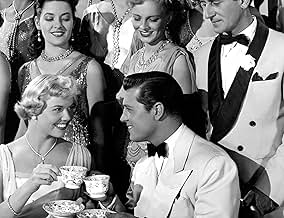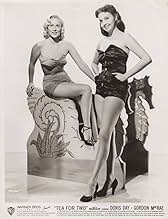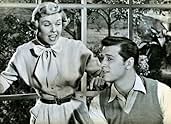IMDb RATING
6.5/10
2.3K
YOUR RATING
A socialite with aspirations of a career in show business bets her wealthy uncle $25,000 that she can say "no" to everything for two days straight, hoping winning will help her fulfill her d... Read allA socialite with aspirations of a career in show business bets her wealthy uncle $25,000 that she can say "no" to everything for two days straight, hoping winning will help her fulfill her dreams.A socialite with aspirations of a career in show business bets her wealthy uncle $25,000 that she can say "no" to everything for two days straight, hoping winning will help her fulfill her dreams.
- Awards
- 1 win total
Patrice Wymore
- Beatrice Darcy
- (as Pat Wymore)
George Baxter
- Mr. Woltz - Show Backer
- (uncredited)
Jack Boyle Jr.
- Chorus Boy
- (uncredited)
Tex Brodus
- Chorus Boy
- (uncredited)
Jack Colton
- Chorus Boy
- (uncredited)
Carol Coombs
- Friend of Lynne & Richard
- (uncredited)
Jack Daley
- Truck Driver
- (uncredited)
Herschel Daugherty
- Theatre Manager
- (uncredited)
Abe Dinovitch
- Taxi Driver
- (uncredited)
Elinor Donahue
- Lynne Smith
- (uncredited)
Featured reviews
Doris Day was involved in many musicals at Warners from 1948 onwards, and 'Tea for Two' is a typical example. Set in the stock market crash of 1929, this variation on 'putting on a show' has Day as both an heiress and a stage-struck singer and dancer, supported by her friends Jimmy the composer (Gordon MacRae, later to appear to good effect in 'Oklahoma' and 'Carousel'), and Tommy the hoofer (Gene Nelson, the cut-price Fred Astaire who ended up directing Elvis' minor musicals).
The score is nice but not that memorable - 'Tea for Two', 'No, No, Nanette', 'I Want To Be Happy', 'Do, Do, Do' - while the story, loosely based on the play No, No, Nanette concerns rivalries, lost investments, and a comic uncle (SZ Sakall, who played the same part in countless films throughout the 1940s and 1950s). Billy de Wolfe and Patrice Wymore round out the cast as a heel of a producer and his sniping leading lady.
As a film, 'Tea for Two' passes the time and boasts some great costumes and colour, even if most of the film doesn't have a 1929 feel. And the bookending sequences, with Sakall telling a tale to a roomful of children, doesn't quite sit with the rest of the material. But it isn't bad.
The score is nice but not that memorable - 'Tea for Two', 'No, No, Nanette', 'I Want To Be Happy', 'Do, Do, Do' - while the story, loosely based on the play No, No, Nanette concerns rivalries, lost investments, and a comic uncle (SZ Sakall, who played the same part in countless films throughout the 1940s and 1950s). Billy de Wolfe and Patrice Wymore round out the cast as a heel of a producer and his sniping leading lady.
As a film, 'Tea for Two' passes the time and boasts some great costumes and colour, even if most of the film doesn't have a 1929 feel. And the bookending sequences, with Sakall telling a tale to a roomful of children, doesn't quite sit with the rest of the material. But it isn't bad.
Since I was a child old movies made my day when they were on the television....Long before video tape machines. Nothing, in my mind, can replace any old movie. Black & white or Technicolour, they are done with class and taste. Now, anything goes. That is a shame. Enjoy this movie. Especially, the actor who plays Doris' uncle. Can' remember his name just now.
Pillow Talk is another Doris Day film I would suggest. Her acting is so wonderful to watch. I have yet to see her act the same way in any movie I have had the pleasure to see. She is one of a kind. Her smile, her singing: Amazing!
Pillow Talk is another Doris Day film I would suggest. Her acting is so wonderful to watch. I have yet to see her act the same way in any movie I have had the pleasure to see. She is one of a kind. Her smile, her singing: Amazing!
This very early Doris Day effort is a re-working of the stage show, "No, No, Nanette!". In order to get her chance to appear in a musical, Nanette has to promise to say 'no', for a prescribed period of time, to everything that is asked of her.
Set notionally in 1929, the period of the original show, but barely even attempting historical accuracy, the film is really only a vehicle for Doris, Warners' new star. So little regard is had to period feel that Doris performs one number in a New Look dress. Soft-focus close-ups and jerky dialogue trundle the action from one musical set piece to the next.
The opening number in the rehearsal room is well-presented, with an attractive New York cityscape beyond the window and a nice 'infinite regression' effect in the wall mirrors. Doris sings and dances appealingly throughout, especially in "Crazy Rhythm" (in which Gene Nelson has a terrific athletic dance solo).
Gordon MacRae as Tommy gives us his usual thoroughly dependable (if uninspiring) male lead, and Patrice Wymore does her customary 'beautiful bad girl' as Bea Darcy. Pauline the wise-cracking secretary is played by Eve Arden (27 years later, the principal of Rydell High in "Grease"). The 'Charleston' sequence is a knockout, and Gene Nelson's bannister dance in "Oh Me, Oh My!" is astonishingly good. The character of Mabel Wylie (Virginia Gibson) is introduced, but then not persevered with, suggesting that some plot sections were later edited out.
Verdict - A pleasant Doris vehicle with songs cleverly embedded in a so-so plot.
Set notionally in 1929, the period of the original show, but barely even attempting historical accuracy, the film is really only a vehicle for Doris, Warners' new star. So little regard is had to period feel that Doris performs one number in a New Look dress. Soft-focus close-ups and jerky dialogue trundle the action from one musical set piece to the next.
The opening number in the rehearsal room is well-presented, with an attractive New York cityscape beyond the window and a nice 'infinite regression' effect in the wall mirrors. Doris sings and dances appealingly throughout, especially in "Crazy Rhythm" (in which Gene Nelson has a terrific athletic dance solo).
Gordon MacRae as Tommy gives us his usual thoroughly dependable (if uninspiring) male lead, and Patrice Wymore does her customary 'beautiful bad girl' as Bea Darcy. Pauline the wise-cracking secretary is played by Eve Arden (27 years later, the principal of Rydell High in "Grease"). The 'Charleston' sequence is a knockout, and Gene Nelson's bannister dance in "Oh Me, Oh My!" is astonishingly good. The character of Mabel Wylie (Virginia Gibson) is introduced, but then not persevered with, suggesting that some plot sections were later edited out.
Verdict - A pleasant Doris vehicle with songs cleverly embedded in a so-so plot.
This film peaks near its beginning with a production number featuring Doris Day and Gene Nelson dancing with both an infinity mirrored wall and the New York skyline showing outside (of some huge windows). The later production number, a blend of "No, No Nanette" and "Tea for Two", is tellingly anti-climatic.
The plot is easy - Ms. Day has to say "No" to everything for a day. But, the movie goes on and on with several songs and dances having little/nothing to do with the story. Other characters and sub-plots are thrown in; with all the extra songs and dances, I have no trouble believing everything in this film was not in the original "No, No Nanette". Some of it all is very good - Day and MacRae sing well, Mr. Nelson dances well, and Eve Arden does her thing - but this feels more like a string of songs and scenes than a movie.
***** Tea for Two (9/1/50) David Butler ~ Doris Day, Gordon MacRae, Gene Nelson, Eve Arden
The plot is easy - Ms. Day has to say "No" to everything for a day. But, the movie goes on and on with several songs and dances having little/nothing to do with the story. Other characters and sub-plots are thrown in; with all the extra songs and dances, I have no trouble believing everything in this film was not in the original "No, No Nanette". Some of it all is very good - Day and MacRae sing well, Mr. Nelson dances well, and Eve Arden does her thing - but this feels more like a string of songs and scenes than a movie.
***** Tea for Two (9/1/50) David Butler ~ Doris Day, Gordon MacRae, Gene Nelson, Eve Arden
Doris Day at her best! This film made me a fan. I love you Doris...and hope you are blessed knowing you've lifted my spirits many times. The color is out of this world in this bright cheerful film too.
Did you know
- TriviaThis is the first of five collaborations between Doris Day and Gordon MacRae. They would later co-star in The West Point Story (1950), On Moonlight Bay (1951), Starlift (1951), and By the Light of the Silvery Moon (1953).
- GoofsIn the 1950 "bookend" scenes, the kids make much of the 1920's raccoon coat and flapper dress they found. In the bulk of the film, set in 1929, no characters wear "Roaring Twenties" clothing.
- Quotes
William 'Moe' Early: I made a fortune today. I sold short.
J. Maxwell Bloomhaus: Who did you sell short to?
William 'Moe' Early: You!
- Crazy creditsThe writing credit card originally read: Screen Play by Harry Clork, and the smudged out credit read: Suggested by the play "No, No, Nanette," by Frank Mandel, Otto Harbach, Vincent Youmans and Emil Nyitray.
Notably missing is the name of lyricist Irving Caesar, who was a co-lyricist of the original Broadway score of "No, No, Nanette." Yet receiving credit are Frank Mandel and Emil Nyitray, who actually wrote the play "My Lady Friends," on which the libretto of "Nanette" was based.
Apparently, there was a subsequent dispute involving these credits, the details of which remain obscure, but as part of the settlement of the matter, Warners agreed to blur the source credits on all future prints of the film (which now includes video, DVD, Blu-ray and cable TV versions).
- ConnectionsFeatured in Biography: Doris Day: It's Magic (1998)
- SoundtracksCharleston
Lyrics by Cecil Mack
Music by James P. Johnson (as Jimmy Johnson)
Danced by Billy De Wolfe and cast
Played at the Westchester estate
- How long is Tea for Two?Powered by Alexa
Details
- Runtime
- 1h 38m(98 min)
- Aspect ratio
- 1.37 : 1
Contribute to this page
Suggest an edit or add missing content





































